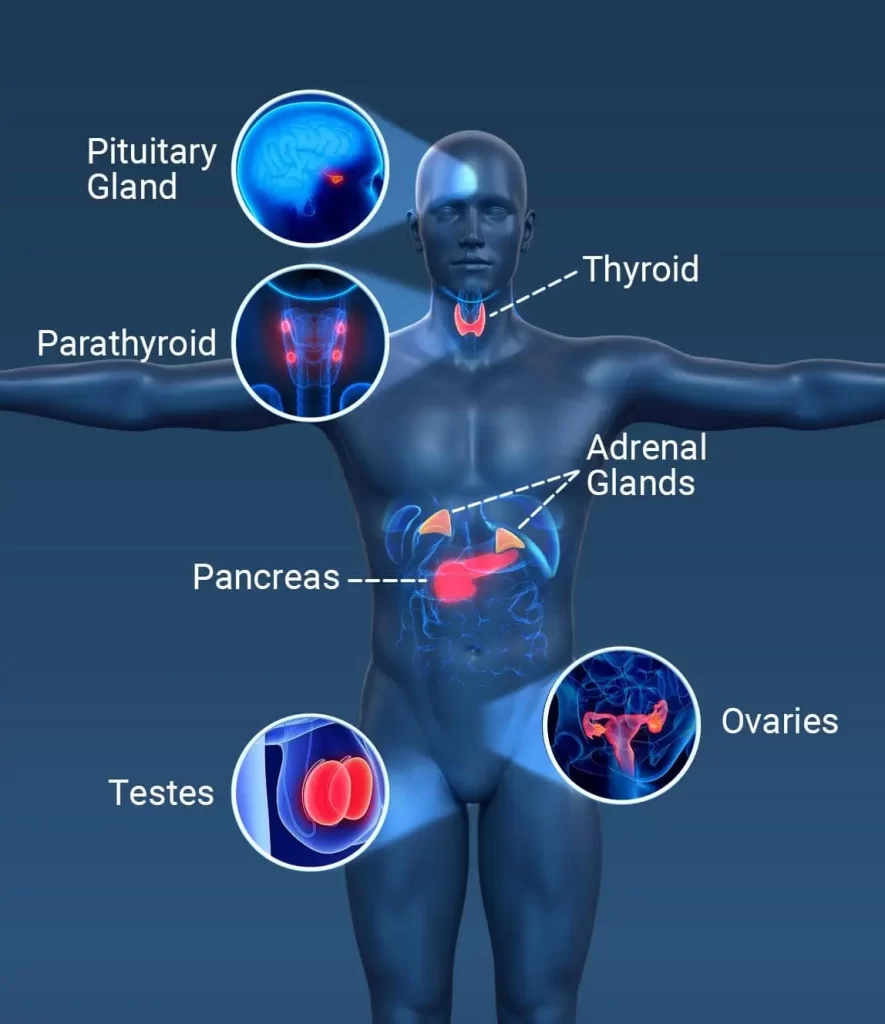The pituitary gland, often called the “master gland,” is essential in regulating many vital body functions. Located in the brain just behind the bridge of the nose, this tiny pea-sized gland holds significant power over various bodily processes. At the Advanced Institute for Diabetes & Endocrinology in Dallas, TX, Dr. VanDyke and her team specialize in diagnosing and treating disorders related to this critical gland.
What is the pituitary gland?
“The pituitary gland controls many other glands in the body, which is why we call it the master gland,” explains Dr. VanDyke. It produces several hormones that are necessary for growth, metabolism, and reproduction. These hormones include:
- Prolactin: Important for breastfeeding.
- TSH (Thyroid Stimulating Hormone): Signals the thyroid to produce hormones vital for metabolism.
- FSH and LH (Follicle-Stimulating and Luteinizing Hormones): These control reproductive functions in both men and women.
- ACTH: Signals the adrenal glands to make cortisol, a vital hormone that regulates blood pressure, blood sugar and energy.
- Vasopressin: regulates water balance
- Growth hormone: important for normal childhood growth
- Oxytocin: important during childbirth and bonding with baby
At Dr. VanDyke’s Dallas-area clinic, her endocrinology expertise extends to conditions affecting every part of the endocrine system, ensuring that patients receive comprehensive care for hormone imbalances and disorders.
“If we performed 1,000 random autopsies, we might find that up to 200 of those individuals had a pituitary tumor.”
Hormonal disorders and pituitary tumors
While pituitary tumors are relatively common, many people may never know they have one because the tumors often remain inactive. “If we performed 1,000 random autopsies,” Dr. VanDyke notes, “we might find that up to 200 of those individuals had a pituitary tumor.” These tumors often don’t cause symptoms or release excess hormones. However, when they do, they can create significant health issues, which is why timely diagnosis is essential.
Types of pituitary tumors
There are two types of pituitary tumors: secreting and non-secreting.
- Secreting tumors produce excessive amounts of certain hormones, leading to various symptoms depending on the hormone involved.
- Non-Secreting tumors do not produce hormones but can cause problems due to their size, potentially pressing on nearby structures, such as the optic nerves, leading to vision issues.
For instance, one type secreting tumor is a prolactinoma, which makes too much prolactin, causing symptoms like irregular periods or erectile dysfunction. Another is Cushing’s disease, where excess ACTH causes high cortisol levels, leading to weight gain, diabetes, and high blood pressure. Sometimes these tumors make more than one type of hormone.
Symptoms of pituitary tumors
Symptoms of pituitary tumors can vary widely depending on the type of tumor and which hormones are involved. Some of the symptoms include:
- Weight gain
- Irregular periods or erectile dysfunction
- Vision problems, particularly tunnel vision
- High blood pressure and brittle bones
- Headaches
If you experience any of these symptoms, it is vital to seek medical attention. Dr. VanDyke and her team at the Advanced Institute for Diabetes & Endocrinology in Dallas are well-equipped to assess and treat pituitary disorders, ensuring patients receive personalized and effective care.
Diagnosis and treatment of pituitary disorders
“When we diagnose a pituitary tumor, we first determine whether it is secreting or non-secreting,” says Dr. VanDyke. Imaging tests such as MRI scans are often used, along with blood tests to measure hormone levels. Treatment depends on the tumor type and its effects on the body.
If the tumor is causing significant symptoms or affecting vision, surgical removal is recommended. However, prolactinomas are an exception—medications like cabergoline or bromocriptine are typically used, as they often offer better outcomes than surgery. In some cases, if the tumor is small and not causing immediate issues, careful monitoring may be all that’s needed.
Comprehensive care for endocrine health
At the Advanced Institute for Diabetes & Endocrinology, Dr. VanDyke’s practice is dedicated to providing high-quality, patient-focused care. With expertise in managing hormonal disorders from the pituitary gland and beyond, Dr. VanDyke’s approach ensures that patients are fully supported in their journey toward optimal health.
🎥 Watch Dr. VanDyke’s story in the video to learn more about pituitary disorders and how they impact overall health.

